
Kent is a ceremonial county in the South East England region, the closest county to continental Europe. It borders Essex across the entire estuary of the River Thames to the north; the French department of Pas-de-Calais across the Strait of Dover to the south-east; East Sussex to the south-west; Surrey to the west and Greater London to the north-west. The county town is Maidstone.

Margate is a seaside town on the north coast of Kent in south-east England. The town is estimated to be 1+1⁄2 miles long, 16 miles north-east of Canterbury and includes Cliftonville, Garlinge, Palm Bay and Westbrook.

Palladian architecture is a European architectural style derived from the work of the Venetian architect Andrea Palladio (1508–1580). What is today recognised as Palladian architecture evolved from his concepts of symmetry, perspective and the principles of formal classical architecture from ancient Greek and Roman traditions. In the 17th and 18th centuries, Palladio's interpretation of this classical architecture developed into the style known as Palladianism.
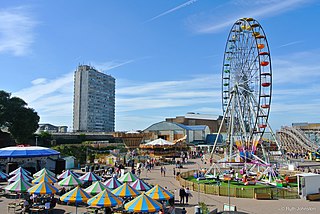
Dreamland Margate is an amusement park and entertainment centre based on a traditional English seaside funfair located in Margate, Kent, England. The site of the park was first used for amusement rides in 1880, although the Dreamland name was not used until 1920 when the park's Grade II* listed Scenic Railway wooden rollercoaster was opened.

Turner Contemporary is one of the UK's contemporary art galleries. Celebrating Margate’s connection with the painter J. M. W. Turner, an artist who believed that art could be an agent of change, its year-round exhibition programme offers free access to creative and cultural experiences.

Sir Herbert Baker was an English architect remembered as the dominant force in South African architecture for two decades, and a major designer of some of New Delhi's most notable government structures. He was born and died at Owletts in Cobham, Kent.
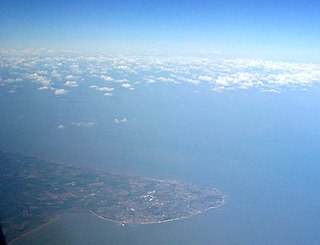
North Foreland is a chalk headland on the Kent coast of southeast England, specifically in Broadstairs.
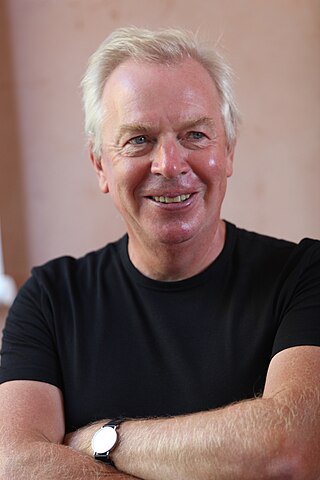
Sir David Alan Chipperfield, is a British architect. He established David Chipperfield Architects in 1985, which grew into a global architectural practice with offices in London, Berlin, Milan, and Shanghai.
Harrietsham is a rural and industrial village and civil parish in the Maidstone District of Kent, England noted in the Domesday Book. According to the United Kingdom Census 2001, it had a population of 1,504, increasing to 2,113 at the 2011 Census. The parish is in the North Downs, 7 miles (10 km) east of Maidstone and includes the settlements of Marley, Pollhill and Fairbourne.
The year 2011 in architecture involved some significant architectural events and new buildings.
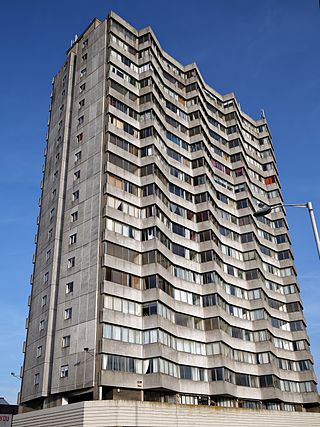
Arlington House is an 18-storey residential apartment and commercial block on the seafront of Margate, Kent, England, next to Margate railway station and Dreamland Margate. It was developed by Bernard Sunley and designed by Russel Diplock, and is known for every apartment having a sea view. The building was designed in the style of Brutalist architecture.

The Bank of England £20 note is a sterling banknote. It is the second-highest denomination of banknote currently issued by the Bank of England. The current polymer note, first issued on 20 February 2020, bears the image of Queen Elizabeth II on the obverse and the image of painter J. M. W. Turner on the reverse. It replaced the cotton paper note featuring a portrait of economist Adam Smith, first issued in 2007.
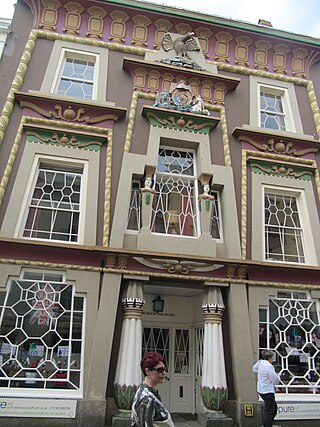
Egyptian Revival architecture in the British Isles is a survey of motifs derived from Ancient Egyptian sources occurring as an architectural style. Egyptian Revival architecture is comparatively rare in the British Isles. Obelisks start appearing in the 17th century, mainly as decorative features on buildings and by the 18th century they started to be used in some numbers as funerary or commemorative monuments. In the later 18th century, mausoleums started to be built based on pyramids, and sphinxes were used as decorative features associated with monuments or mounted on gate piers. The pylon, a doorway feature with spreading jambs which support a lintel, also started to be used and became popular with architects.
William Edmunds was a British architect who designed Margate Lighthouse, Holy Trinity Church, Margate and Holy Trinity Church, Dover. He was also father of the convicted murderer Christiana Edmunds.
Holy Trinity Church, Margate is a Church of England church in Margate, Kent, and in the Diocese of Canterbury.

The Carlton Cinema, in Westgate-on-Sea, Kent, England dates from 1910. The extension of the railway into East Kent in 1871 led to the creation of a number of seaside resorts along the Kent coast to the west of Margate. Westgate-on-Sea was built in the 1870 by the London-based developers Corbett & McClymont. In 1910, a town hall was constructed but within 2 years, the building had been converted into a cinema. Originally named the Town Hall Cinema, it was renamed the Carlton in the 1930s. It remains a, privately owned, functioning cinema and is a Grade II listed building.
Emily Anne Peasgood is an Ivors Composer Awards winning English composer and sound artist. She is the niece of actress and television presenter Julie Peasgood.
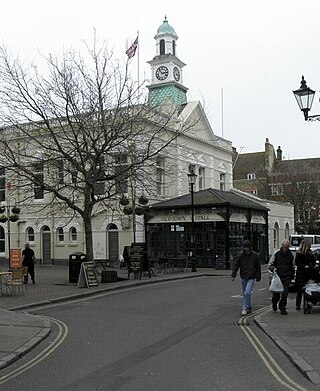
Margate Town Hall is a municipal building in the Market Place, Margate, Kent, England. The complex, which was the headquarters of Margate Borough Council, consists of the two distinct buildings connected by a bridge: it is Grade II listed.

















